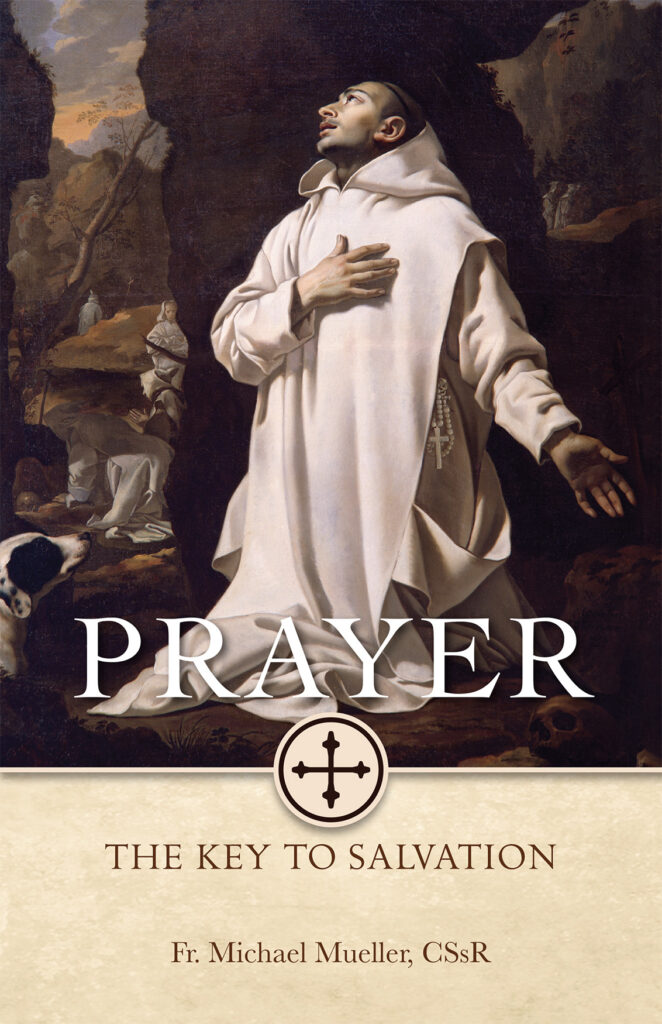The following is a compilation of excerpts taken from Fr. Michael Mueller, CSsR’s, Prayer: The Key to Salvation. Mueller, speaking on meditation, explains how its practice softens our hearts, its necessity in preserving Divine grace in our souls, and the practicalities for where, when, and how often to meditate.
ooo
Practice Of Meditation
Before entering on the practice and method of meditation, it will be well to establish its necessity. There are two things upon which this necessity is grounded: The first is pointed out by St. Augustine, where he says that he who keeps his eyes shut cannot possibly see either the way or the means of salvation. Eternal truths are spiritual, and cannot be discerned by the eyes of the body, but only by the eyes of the mind in thought and consideration. Now he who does not practice meditation does not consider, and consequently does not see, the importance of eternal salvation, nor the way he should follow to gain it. St. Bernard, writing to Pope Eugenius on this subject, says: “I fear for thee, Eugenius, lest the multitude of affairs, prayer and meditation being intermitted, should bring thee to a hard heart, which does not dread, because it does not know itself.” To obtain salvation we must have tender hearts; that is, docile to receive the impressions of the divine inspirations, and prompt to put them in execution.
Meditation Softens Our Hearts
Our hearts are of themselves hard, because they are wholly inclined to carnal pleasures, and opposed to the laws of the spirit. They are softened by the influx of grace, and this is communicated to them by means of meditation, in which the soul, by considering the divine goodness and the great love which God has for it, and the immense benefits which He has
conferred upon it, becomes inflamed, is softened and made obedient to the Divine calls, as David experienced, who said: “In my meditation a fire shall flame out.” (Ps. 38:4).
Without it the heart remains hard, obstinate, disobedient, and will be lost: “A hard heart shall fear evil at the last; and he that loveth danger shall perish in it.”
It’s Necessity For The Preservation Of Divine Grace In Our Souls
The second fundamental and more weighty principle on which is grounded the necessity of meditation is that those who do not meditate do not pray, and thus lose their souls. The virtues of those who pray cannot be firm and persevering, because perseverance is only to be obtained by prayer, and by persevering prayer. Hence, those who pray not perseveringly will not persevere. It was on this account that St. Paul exhorted his disciples to pray always, without intermission: “Pray without ceasing.” (1 Thess. 5:17).
And for the same reason our Blessed Saviour “spoke a parable . . . that we ought always to pray, and not to faint.” (Luke 18:1). Meditation, therefore, is morally necessary for the preservation of Divine grace in the soul. I say morally necessary, because, although the soul, strictly speaking, may, without the aid of meditation, continue in the state of grace, yet, if meditation be laid aside, it will be morally impossible, that is, very difficult, not to fall into grievous faults; and the reason is, what has just been said, that when a person does not meditate, being distracted with other affairs, he knows but little of his own wants, of his dangers, and of the means which he ought to adopt to escape them, and is but little sensible of the urgent necessity of prayer; and hence he neglects prayer, and by not praying is lost.
The Best Place To Meditate
The best place for meditation is the church or chapel; but where a person cannot avail himself of these, he may make his meditation at home or in the fields; he may even make it on the road, or at work, by fixing his mind on God. How many poor peasants, having no other opportunities, meditate well while they are at work, or journeying from place to place! He who seeks God finds Him in all places and at all times.
The Best Time To Meditate
The best time for meditation is the morning, as one is giving himself to the Lord’s direction so as to guide his acts throughout the day. The duties of the day will go on very indifferently if a person neglects to make his meditation in the morning.
How Often Should You Meditate Each Day?
Meditation ought properly to be made twice in the day, morning and evening; but when it can only be made once, it should be in the morning. The venerable Carafa says that a fervent act of love, made during the morning meditation, is sufficient to keep the soul in a state of holy fervor during the whole day. As to the length of time which should be spent in meditation, a confessor or director will best regulate that by his experience and prudence. This, however, is certain that half an hour is not sufficient for those who would attain a high degree of perfection. For those who are only beginning, half an hour may suffice; but, above all, they should not discontinue their meditations when visited by spiritual dryness.
ooo
This article is taken from a chapter in Prayer: The Key to Salvation by Fr. Michael Mueller, CSsR which is available from TAN Books.









